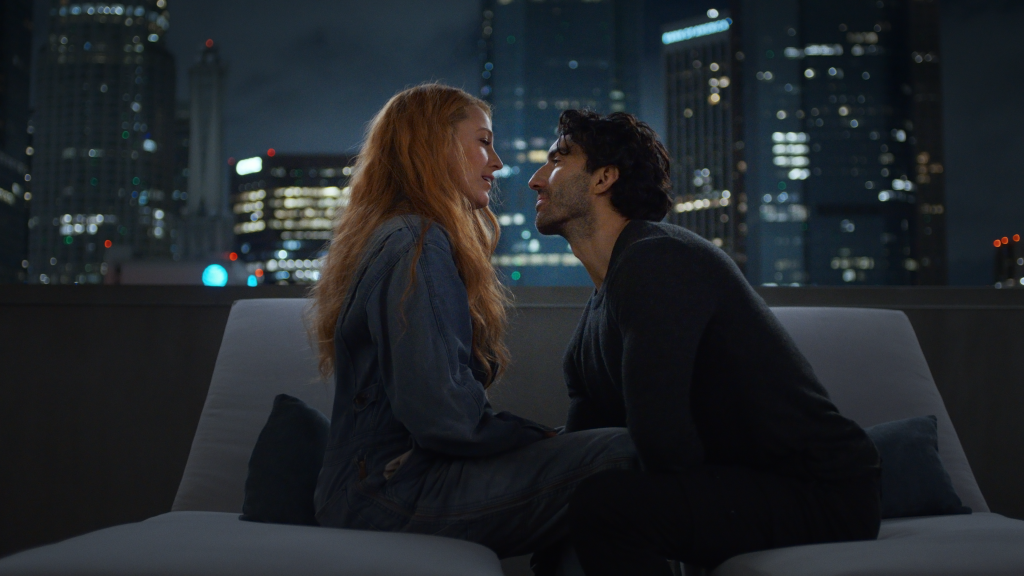Warning: This article deals with the topic of domestic violence, self-harm, and suicide and could be triggering for some readers.
Even if you’re just a casual internet scroller, you’ve certainly heard chatter in the past few weeks about It Ends With Us.
The new film, starring Blake Lively and adapted from a TikTok-famous book of the same name, has been the centre of a lot of controversy, with rumours of cast feuds, on-set diva antics, and the representation of potentially triggering content.
The movie follows Lily Bloom, a florist (you’d have to be with that name) who meets and falls in love with a handsome, charming stranger. They build a life together, but when her teenage boyfriend makes an appearance, everything starts to fall apart.
At least, that’s how it’s sold. Just another classic rom-com. If you were casually following the movie’s press cycle, without diving into the think pieces and TikTok explanations, you’d be going into the cinema without a second thought.
But anyone who’s read the book or seen the movie knows that it contains graphic depictions of domestic violence and coercive control.
Lively has been hit with criticism for glossing over these ‘darker’ parts of the film, rather than addressing them with the gravity they deserve. In one video she encourages fans to “grab your friends [and] wear your florals” before heading to the cinema.
As a result, some audience members found themselves confronted with graphic scenes they weren’t emotionally equipped to handle, especially in public. They argue that perhaps, with the right trigger warnings, this psychological ambush wouldn’t have to happen.
However, are trigger warnings technically a huge plot spoiler?
Why do we have trigger warnings?
A trigger warning is a statement at the start of a book, movie, or TV show episode warning audiences about any potentially distressing material it may contain — self-harm, suicide, domestic violence, etc.
From a psychological point of view, trigger warnings are important. They empower people to make informed choices about the kind of content they want to engage in.
“This sense of control and agency is psychologically valuable as it allows people to prepare themselves mentally (or alternatively, opt out if they feel unable to cope),” says clinical psychologist Dr Maria-Elena Lukeides.
They also help to acknowledge someone’s experiences, making them feel seen and respected, which, in the right environment, can deliver a sense of psychological safety.
Just like It Ends With Us the movie, the book it’s based on didn’t contain trigger warnings, and readers were similarly blindsided by its content.
“If I knew [about the graphic domestic violence] beforehand I would have stopped before I started, or at least been able to better prepare myself emotionally,” one person shared on Reddit, while lamenting the lack of warnings.
Are trigger warnings a spoiler?
There’s an argument to be made that the presence of trigger warnings technically spoils the storyline. Isn’t it better to experience the surprise of violence alongside the main character? To be just as shocked by it as they are?
It’s common for TV episodes to carry trigger warnings now — like the episode of Better Call Saul that tipped viewers off to a major character’s death by featuring a suicide hotline number at the beginning. Or the episode of Severance which warned viewers about a depiction of self-harm. Baby Reindeer, You, The Morning Show… the list goes on.
They became commonplace after the release of the 2017 Netflix show 13 Reasons Why, which centred around a teen girl who killed herself and included a graphic scene of her slitting her wrists.
It had no trigger warnings — until a year later, after the show was criticised for glamorising self-harm and being linked to an uptick in teen suicide rates. Eventually, the graphic scene was removed from the episode like it was never there, and a warning was slapped at the beginning of each episode.
Since then, a growing number of TV shows have begun to include trigger warnings, but the same policy hasn’t quite been extended to movies.
Do trigger warnings even work?
According to Dr Lukeides, some research suggests trigger warnings may actually increase anxiety and distress, rather than reduce it.
“They can create anticipatory anxiety for someone before they encounter the content,” she says. “They can also prime people to expect a negative reaction.”
So before going into the movie, you’re bracing yourself for confronting scenes, triggering any negative mental discomfort before it even happens — if it was even going to come about at all.
“It is also worth noting that the use of trigger warnings may inadvertently encourage avoidance behaviours in some people, which is often counterproductive for those dealing with trauma or anxiety,” Dr Lukeides explains.
“The longer we avoid fearful or triggering stimuli the stronger the fear becomes and in general, treatment becomes more difficult.”
Spoiler-free trigger warnings: is there a happy medium?
Even when the movie or book doesn’t come with trigger warnings, they’re still out there to be found.
Along with countless Reddit threads sharing warnings for viewers, the website DoesTheDogDie is an extensive online resource sharing trigger warnings for movies, TV, books, video games and more.
It features every trigger you could imagine, from kidnapping and parent death to creepy crawlies and needle use. “I spoil movies and I’m proud of it,” proclaims the site’s founder, John Whipple, on its homepage.
It’s an empowering resource. It takes away the fear of the unknown for audiences who know their vulnerabilities.
Perhaps this is the happy middle ground. Audiences aren’t blasted with trigger warnings that could potentially spoil the movie or put them unnecessarily on edge, but those who want to avoid particular topics can make the informed decision to opt out.
Read more stories from The Latch and subscribe to our email newsletter.







